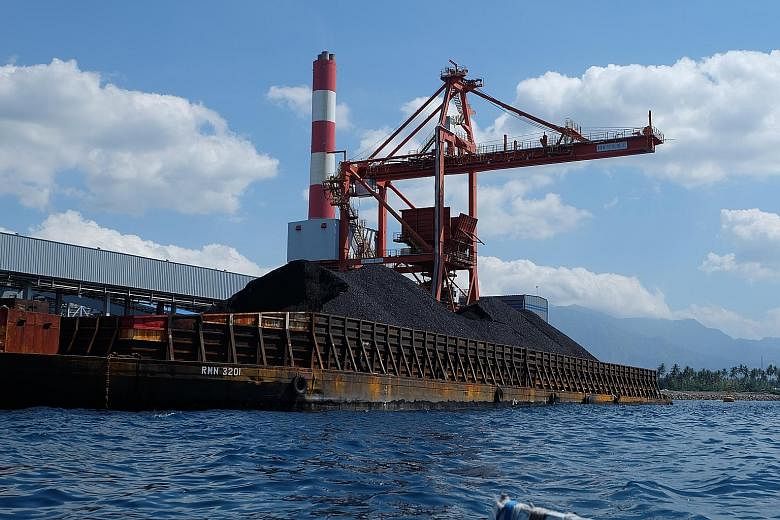Villager Mr Bakri is indifferent about whether a coal-fired power plant in his neighbourhood in north Bali should go ahead and expand to more than double its capacity.
The 40-year-old freelance construction worker struggles to make ends meet. He relies on work from neighbours and is more interested in just trying to make a living.
"Some oppose, some support," Mr Bakri said, referring to the expansion plan for the nearby 426MW Celukan Bawang power plant, as he took this Sunday Times correspondent for a ride around his neighbourhood on a ramshackle motorcycle.
The power plant is about 30km west of Singaraja city on the north coast of the tourist island.
"I worked there when they built the facility," said Mr Bakri, who goes by just one name. He said he would be fine either way, when asked whether he would support the expansion plan to add another 660MW capacity to the plant, which is the only coal-fired power station in Bali.
When asked about the expansion, some of Mr Bakri's neighbours are tight-lipped while others dare to speak openly.
-
190
-
Estimated number of premature deaths a year caused by Celukan Bawang, according to Greenpeace.
-
55%
Percentage of coal, as a source of fuel to generate electricity, in Indonesia's energy mix as of last year.
Mr Radot Simorangkir, a fish trader in his 60s, complains about the pollution and damage to local livelihoods, repeatedly cursing the power plant operator.
Speaking to The Sunday Times at his home in a kampung near the plant, he said: "Polluted air from the coal-fired power plant hurts your eyes. Coal residue has caused a lot of effects. We didn't know earlier that they would use a lot of coal. It could impair your eyes, irritate your lungs.
"They promised to give compensation but never did. The power plant has so far given no benefit. It feels like we are being occupied. We don't get jobs from them either."
Mr Radot's claims are both supported and dismissed by his neighbours. Those who do not agree with him include Mr Made Padayasa, owner of "Riang" fish barbecue restaurant, which is about 1km from the power plant.
"No pollution. We are not affected by any dust or anything," Mr Padayasa told The Sunday Times.
Mr Armain, a fisherman, takes a more realistic stance. He would agree to the expansion plan, under one condition: he gets a job.
"If they build one more, would they provide me a job? Last time I quit being a fisherman and worked to build the power plant. They terminated (my services) when the project was completed," he said.
He now catches marlin out at sea and says the power plant has not affected his catches.
The mixed feelings towards the Celukan Bawang plant show the challenges Indonesia faces in its bid to shift to more renewable energy.
The government has been rushing to build more power plants, many of them powered by coal, to meet demand for electricity from its growing middle class and manufacturing sector.
Indonesia has abundant coal reserves to fuel that growth but with that come local concerns about air pollution and greenhouse gas emissions. Burning coal is the world's single-largest source of carbon dioxide that is heating up the planet. On the densely populated island of Java, protests have grown and delayed the construction of a number of power plants.
Energy analysts and conservationists also point to the plunging costs of wind and solar power as alternatives.
Indonesia recently said "no more" to coal-fired power plant projects for Java, Bali and the eastern parts of the country - even though a number of coal-fired plants are still being built. The reason given for Java and Bali is that the regions already have more than enough electricity reserve margin - capacity over and above that normally needed - while the eastern regions like Papua and Maluku are too distant from the country's coal mines.
EXPANSION USES OLD PERMIT
But the Celukan Bawang's planned expansion is based on an old permit it had secured, against which several villagers and Greenpeace Indonesia filed objections on grounds that it is legally flawed and that the existing plant has already caused pollution and affected public health.
In August, Bali's state administrative court rejected the lawsuit to block the expansion plan.
Greenpeace said Celukan Bawang, which started operations in 2015, caused an estimated 190 premature deaths a year, and if it is allowed to expand, premature deaths could rise to 740 every year for the 30-year concession period.
The Indonesian government still allows coal-fired power plants, but urges the use of environmentally friendly and high efficiency technology. As of last year, coal was Indonesia's single largest source of fuel in electricity generation, comprising 55 per cent of the energy mix, followed by gas at 26 per cent, renewable energy (mainly large hydro and geothermal power) at 12 per cent and oil at 7 per cent, according to government figures.
Under the state utility's latest 10-year energy business development plan for 2018 to 2027, the aim is to add a further 56GW of capacity nationally, with coal comprising 48 per cent of the energy mix, gas at 25 per cent and renewable energy of all types at 27 per cent.
While the government shows a strong commitment to renewable energy, the judicial system and economy are not really on its side, energy analysts say.
Among the challenges: Indonesia is a major thermal coal producing country; coal-fired power plant technology is still viewed as cheaper; and low renewable energy awareness.
"People are not fully aware of what renewable energy is, although some know better, thanks to the green campaigns," said Mr Faisal Yusuf, executive director of Benih.org, which advocates for renewable energy in Indonesia. "Those residents near coal-fired power plants might live on less than US$2 (S$2.75) equivalent a day. They don't care about renewable energy. They think more about what meals to eat each day."
Some conservationists fear that policymakers might increase support for local coal use because of the recent fall in the value of the rupiah. That makes imported renewable energy technology more expensive, Mr Faisal said.
Ms Hindun Mulaika, climate and energy manager at Greenpeace Indonesia, said that for the government, coal is the main solution to providing energy for the nation, the cheapest and most affordable solution for a country that is catching up on economic development.
"The government is turning a blind eye to the impacts of the use of coal. They have never calculated the economic losses of the residents who had fallen ill due to pollution, the environmental damage, the residents losing jobs as a result of those," Ms Hindun said.




